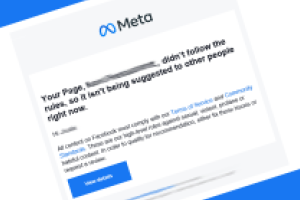Everyone wants their website to rank higher on Google Search results. While certain features – such as better loading times or mobile-friendly designs – might require you to pay more to switch hosts or rebuild your website, that isn’t the case with all search engine optimization (SEO). If you’re working to improve your website’s ranking, you might hear the term “metadata” in relation to search engines. Let’s dive into this often overlooked part of SEO that doesn’t require you to rebuild your website – just input some data.
What is Metadata?
If you type metadata into Google, the first definitions that come up (after the B2B lead generator of the same name) are “Metadata is ‘data that provides information about other data,’ but not the content of the data.” While this sounds confusing, it actually makes a lot of sense when applied to the SEO/website version of the term.
Metadata are text tags you place on a website page (or a specific element of that page, such as an image) that tell the search engine what that page/element is when it scans your website. The search engine then uses this data in how it ranks you (just like with keywords, which metadata usually contains) and even how your search results are displayed.
Search engines automatically create metadata by pulling data from your pages, but you can replace it with custom metadata that provides better search results and SEO, along with other features we’ll discuss below.
The Metadata Search Engines Look For (and Display)
We’re going to focus on the three major types of metadata that occur on websites that you can easily fill, with most website creation tools having options to use these, and we’ll talk more about where and how below.
Meta Title
This is the title of the page. On the front end, you can see this the most on browser tabs, search engine results (the larger text on top), and “article populations” when you drop page links into search engines and messaging services. Usually is relatively short (60 characters), usually a title summary of the page and the domain, such as this blog which contains the title and shortened name of the site.
Meta Description
The companion of the meta title, the meta description is a longer (usually around 160 characters) summary in sentence style instead of title fashion. These typically describe what the page is and why the domain is providing it, such as “[Company Name] provides [service keywords] to people of the [geographical location]” and shows up beneath the title on search results or articles.
Image Alt-Text
Ever notice when a page is loading in, sometimes before the image loads in, there’s a text description of it instead? That’s the alt-text of an image. It should briefly describe what the image is. Decorative images (website accents or space-fillers) don’t need this. For more website tools, you’ll have the option of inserting this text when you upload the image. You may have the option of tagging an image as featured, which will make it show up as the first image tied to the page.
Other Effects of Good Metadata
Search engines aren’t the only resources that use metadata, and like many of the SEO methods, the reasons they get promoted aren’t just for better search indexing.
- Better Social Media Posting: As mentioned above, metadata is also used to “populate” articles when posted into social media and messaging applications. By formatting this metadata yourself, you have higher click-through rates and more professional articles.
- Improved Accessibility: The primary use of alt-text is to provide descriptions for the visually impaired (with the secondary advantage of allowing image search engines to give better results).
- Higher Brand Recognition: By creating your metadata that includes information about your brand, company, and domain, you not only increase search results about your brand but also increase visibility wherever that page is shared.
While metadata is a component of good SEO, it’s not the only one. You need to uncover where your SEO problems lay and figure out where you need to enhance your SEO. This can include website redesigns, content creation, and more. Vision has helped countless businesses become more visible on the internet through better digital marketing, including website development. Contact us today to see how we can help you.




